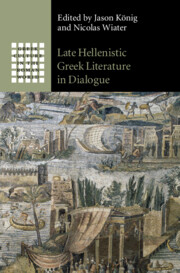Book contents
- Late Hellenistic Greek Literature in Dialogue
- Greek Culture in the Roman World
- Late Hellenistic Greek Literature in Dialogue
- Copyright page
- Contents
- Figure
- Contributors
- Preface
- Abbreviations
- Introduction
- Chapter 1 The Empire Becomes a Body
- Chapter 2 Pyrenaean Mountains and Deep-Valleyed Alps
- Chapter 3 Sailing the Sea, Sailing an Image
- Chapter 4 Ecocritical Readings in Late Hellenistic Literature
- Chapter 5 Civic and Counter-Civic Cosmopolitanism
- Chapter 6 The Wrath of the Sibyl
- Chapter 7 Imagining Belonging
- Chapter 8 Philosophical Self-Definition in Strabo’s Geography
- Chapter 9 Narrating ‘the Swarm of Possibilities’
- Chapter 10 ‘Asianist’ Style in Hellenistic Oratory and Philostratus’ Lives of the Sophists
- Chapter 11 Greek Reading Lists from Dionysius to Dio
- Chapter 12 Envoi
- References
- Index Locorum
- General Index
Chapter 2 - Pyrenaean Mountains and Deep-Valleyed Alps
Geography and Empire in the Garland of Philip
Published online by Cambridge University Press: 21 April 2022
- Late Hellenistic Greek Literature in Dialogue
- Greek Culture in the Roman World
- Late Hellenistic Greek Literature in Dialogue
- Copyright page
- Contents
- Figure
- Contributors
- Preface
- Abbreviations
- Introduction
- Chapter 1 The Empire Becomes a Body
- Chapter 2 Pyrenaean Mountains and Deep-Valleyed Alps
- Chapter 3 Sailing the Sea, Sailing an Image
- Chapter 4 Ecocritical Readings in Late Hellenistic Literature
- Chapter 5 Civic and Counter-Civic Cosmopolitanism
- Chapter 6 The Wrath of the Sibyl
- Chapter 7 Imagining Belonging
- Chapter 8 Philosophical Self-Definition in Strabo’s Geography
- Chapter 9 Narrating ‘the Swarm of Possibilities’
- Chapter 10 ‘Asianist’ Style in Hellenistic Oratory and Philostratus’ Lives of the Sophists
- Chapter 11 Greek Reading Lists from Dionysius to Dio
- Chapter 12 Envoi
- References
- Index Locorum
- General Index
Summary
Taking its inspiration from the ‘spatial turn’ in the humanities, this paper studies the representation of (imperial) space in the epigrams of the Garland of Philip. It analyses the ways in which geographical space is imagined and depicted in these poetical texts. Distant regions are no longer seen as completely unfamiliar and outlandish, but populate the imaginary map of an ever growing world. Italy and in particular Rome become part of the Greek landscape. The contribution examines different strategies that these texts employ to impose order on this vast world, such as stereotypical connections with myth or ‘classical’ Greek history. In the process, some place names are loaded with cultural significance and become Greek lieux de mémoire (P. Nora). This integration of a huge empire into the ways in which Greeks understood the(ir) world can thus be seen as an important example of an intellectual response to empire.
- Type
- Chapter
- Information
- Late Hellenistic Greek Literature in Dialogue , pp. 69 - 93Publisher: Cambridge University PressPrint publication year: 2022

